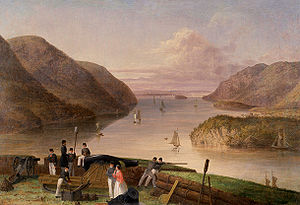Samuel Holden Parsons
At the age of nine, his family moved to Newburyport, Massachusetts, where his father, an ardent supporter of the First Great Awakening, took charge of the town's new Presbyterian congregation.
Actively involved in Patriot circles on the eve of the American Revolutionary War, he was a member of New London's Committee of Correspondence.
Parsons went on to suggest that the time for discussing colonial independence from Britain was at hand: "The idea of inalienable allegiance to any prince or state, is an idea to me inadmissible; and I cannot but see that our ancestors, when they first landed in America, were as independent of the crown or king of Great Britain, as if they hade never been his subjects; and the only rightful authority derived to him over this people, was by explicit covenant contained in the first charters."
In April 1775, immediately after the battles of Lexington and Concord, Parsons, along with colleagues in the Connecticut legislature, began promoting a project to take Fort Ticonderoga from the British, securing commitments of both public and private funds to underwrite the expedition.
Parsons successfully transported his men from Long Island, joining the main body of the army as it withdrew from the city.
David Bushnell, an inventor from Connecticut, had devised a submarine called Turtle which he planned to use to attach torpedoes to British warships.
In December 1779, Parsons took command of Putnam's Division, and spent the following months recruiting, training, and trying to engage British General Sir Henry Clinton in battle.
Parsons served on the board of officers which tried Arnold's accomplice, Major John André, and ultimately sentenced him to death.
In the winter of 1781 he helped suppress the mutinies of soldiers in Pennsylvania and New Jersey, and took part in efforts to clear out Tory militias in Westchester, north of New York.
After months of containing British forces in New York, American troops, now bolstered by French reinforcements, departed for Virginia.
Something of a celebrity, Parsons was elected to the legislature, became involved in organizing the Connecticut branch of the Society of the Cincinnati, and was appointed by Congress to help with Indian diplomacy on the western frontier.
The man did not get down till evening, but about noon the canoe, broken in pieces, came by the Block House, and some articles known to belong to General Parsons were taken up and others seen to pass.
After his death, due to the depreciation of currency values, after Letters of Administration were sent in 1789 to his son Enoch, "..His estates, both in Middletown and Marietta, were found to be insolvent.."[8] Parsons' surviving children included:
